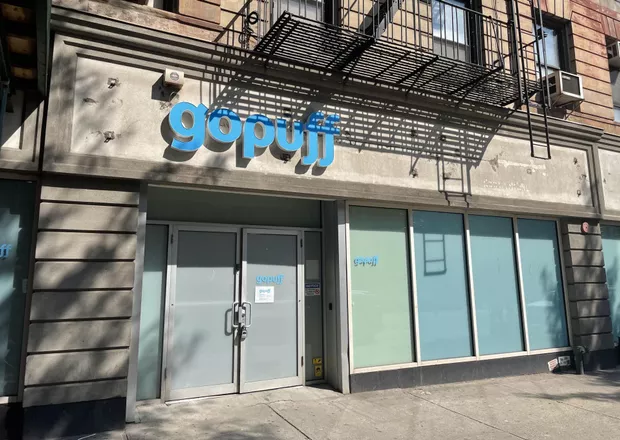

Rapid grocery delivery concepts that saw meteoric growth, with venture capital-backed promises to deliver goods at lightning speed, are experiencing something of a flameout.
Layoffs, political responses, wage investigations and market downturns dominate the headlines when it comes to the sector – less than a year after operators entered the market as the newest retail darling. As these groups look to correct their businesses and stem the financial bleeding, they are forced to consider how to navigate changing consumer demands, a tight economy, and what could be a lukewarm reception from the retail real estate community.
Compass assistant Ziv Sonkin said of the retail apartment space at 150 West 26th St. It went bankrupt in March after the war in Ukraine cut its funding.
“The owner was not really left with much of a remedy, as we were notified of this somewhat overnight. [the company] I stopped working. It was a bit surprising.”
Sonkin represents the landlord in its search for a new tenant.
James Famolaro, president of Meridian Retail Leasing Capital, which in the past 12 months has arranged three leases in the city for Getir and one for Fridge No More.
Getir layoffs 14% of its workforce in May and is now being investigated by the New York State Department of Labor over employee pay disputes. The refrigerator is no more permanently closed in March.
“After you burn your fingers once, you are unlikely to ever put your hand on the flame again,” Famolaro said, noting that the Getir locations arranged by his team are still in place, unlike No more refrigerator rent. “Here’s the thing about trends: After they fade, nobody wants anything to do with moving forward.”
Urban grocery delivery startup Jokr has expanded rapidly in the US
“Fizzling” isn’t the word everyone uses when it comes to those quick grocery apps that have been forced to back off.
“It was built on quicksand,” Phil Limbert, supermarket expert and food trends editor at today On NBC, he said bisno. “I’m surprised it didn’t explode any faster.”
Just nine months ago, companies like Gorillas, Getir, Jokr, and 1520 were making headlines with their rapid expansion, renting out dozens of city storefronts to fulfill promises of delivery in 15 minutes or less. Lembert . said bisno At the time the model was consideredsillyWithin months, cracks began to appear.
Last week, Gopuff founders and co-CEOs Yakir Gola and Rafael Ilishayev told investors that Gopuff is closing 76 warehouses in the United States and laying off 10% of its global workforce. Gopuff will have 18 locations in New York after consolidation, down from 24.
in June, Jokr, who previously said she plans to eventually own 100 small warehouses in New York City alone and hit evaluation $1.2 billion in December, announced his complete withdrawal from the US market. by December last year, 1520 closed completely After running out of money and not negotiating the sale to the Joker.
“What we’re seeing is a lot of companies that had brilliant leaders who were able to sell concepts to raise huge amounts of money from venture capitalists,” Limbert said. “And it doesn’t seem like anyone in venture capital firms gets a reality check and really understands what the business is or whether consumers want it or not.”
A delivery person walks into the Gorillas location in Manhattan.
The challenges are not just financial.
In December, then-Manhattan Borough President Gil Brewer sent a letter to several state and city agencies, saying that businesses were violating zoning laws by operating as warehouses in designated retail areas.
Last week, the New York City Council introduced bills to regulate app-based express delivery companies and their darkroom stores, I mentioned the city. Under the legislation, they will not be allowed a 15-minute delivery guarantee and will be forced to comply with a maximum delivery load carried by bicycle employees. New York City will have the authority to issue licenses – and violations.
Nico Probst, Head of Government Relations at Getir, said in a statement to bisno. “Getir values our employees, as evidenced by the fact that we employ all team members fully as W-2 employees who earn health benefits and keep 100% of their gratuities.”
Getir isn’t closing New York locations, but it has temporarily halted expansion.
“Express delivery will look very different by this time next year; the players, models, and use cases will change. bisno.
She said New York City warehouses would be combined to serve a larger radius, slowing speed for some neighborhoods, and only one or two models might survive.
“I think there is a need for on-demand delivery, but it is balancing the business, monetizing, selling services, automation, finding partnerships, balancing large basket sizes to maintain,” she said.
According to Brandon Eisner, head of retail thought leadership for the Americas at CBRE, the biggest challenge for online groceries at scale, will come down to price in an inflationary environment.
“People don’t necessarily want to pay for delivery. They want value,” he said. “So I think this is where a lot of companies have gotten in trouble — just paying for services is something they don’t want to do because grocery prices are really going up.”
Robin Abrams, Vice President of Compass, said she expects there will be plenty of uses to take advantage of where express delivery apps have left off.
“There are still new concepts coming and expanding, and all restaurant operators are still making use of the space,” she said. “I see the entire health and wellness sector continuing to expand.”
Meridian’s Famularo said express delivery isn’t particularly difficult on spaces, as it largely includes installed shelving. He’s shopping at about a dozen New York City locations that were once used by express delivery apps.
“If it can be ventilated, we have converted it into a food and beverage space. If we can’t, we are looking for a single tenant – or looking for options to divide the space,” noting that smoking shops are the latest trend in the retail market.
“There are different options; maybe we could try SoulCycle or Barry’s BootCamp. That was another trend before Covid. … In any year, there are two or three trends. Everyone kind of jumps on the bandwagon and drinks Kool-Aid.”
Retail real estate in Manhattan is showing promising signs of a gradual recovery, with rental prices stabilizing and availability declining across many of Manhattan’s most sought-after retail corridors. Jay Norris, who runs Guesst, a provider of tenant sales data for landlords, said the focus these days is trying to find users who serve the neighborhood rather than just paying rent.
“I think there is a responsibility on a lot of landlords to actually feed their communities,” he said. “Like Status 101.”
This will be the approach for the former Buyk area of Nomad, said Compass’s Sonkin, adding that the focus now is on finding a mother-and-pop owner tenant who will be a good fit in the area and stay in the area. space in the long run.
“This space lends itself well to [The Fashion Institute of Technology] The Creative Community at Chelsea. “There are a lot of vintage and used clothing stores in this building… There are also goodwill in the area and a few others, so we had an interest.
“We want to focus on the longevity of the tenant.”
Featuring:
Recent Articles | Back to News
Is New York City still a viable investment option? - by Shallini Mehra
Article
July 21, 2022
Team Betesh arranges $110 million in financing to refinance an office property in Stamford
Article
July 21, 2022

Meridian Capital Group arranges $16.5 million in construction financing for mixed-use property
Article
July 21, 2022

Meridian Arranges Sale of Three-Property, 428-Unit Portfolio in Wisconsin, North Dakota
Article
July 21, 2022

